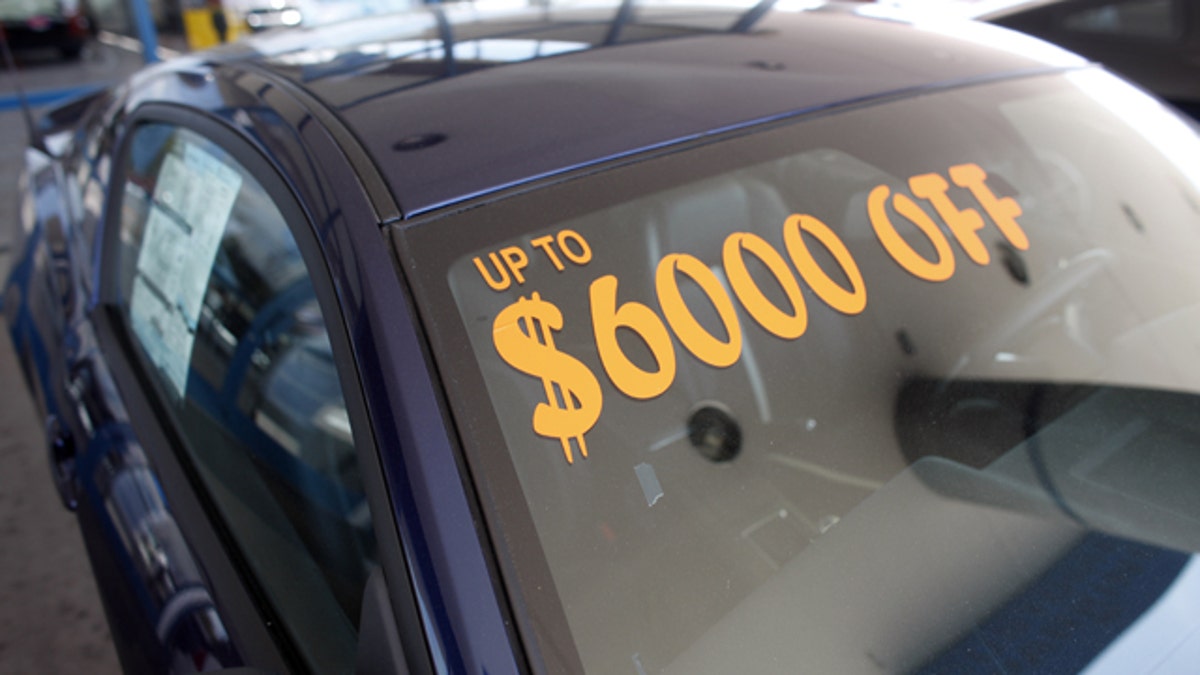
DETROIT - Drivers snapped up new models and rental-car companies and governments expanded their fleets in May, leading to big U.S. sales gains for most automakers. The exception was Toyota, whose tepid results showed that the company's discounts are losing their luster.
The industry's overall jump in sales shows that automakers are benefiting from a fragile but improving economy. Credit is thawing for cars loans and gas prices are stable. Consumers even shrugged off an 8 percent decline in the stock market last month. Ford Motor Co. will boost production through the fall, a sign that it thinks shoppers will keep buying.
Detroit automakers Ford, General Motors Co. and Chrysler Group LLC saw double-digit sales gains over the same month last year, when GM was headed into bankruptcy protection and Chrysler was already there.
Several Japanese, South Korean and European car makers also saw increases of 20 percent or more. If the trend holds for most automaker, May would be the seventh straight month of year-over-year sales increases for the industry.
But consumers backed away from Toyota Motor Co., whose sales rose just 7 percent over last May, even though the company said Memorial Day was its best-selling weekend of the year.
Toyota has been using big incentives since March to drum up sales after it recalled millions of cars and trucks for safety problems.
May's results indicated those deals may be losing their effectiveness. Only the Lexus luxury brand, which began offering unprecedented deals in May, matched the performance of rivals, with sales up 31 percent. The deals included a six-month waiver on payments.
One key factor for automakers was the long Memorial Day weekend — a key selling period that can account for half of all sales for the month.
Paul Taylor, chief economist with the National Automobile Dealers Association, said good weather and a weak Memorial Day last year — which came just a day before GM filed for bankruptcy protection — helped make sales comparatively stronger during last weekend's holiday.
Ford's sales rose 22 percent, boosted by strong demand for the F-Series pickup and new Ford Mustang. Sales to rental, government and commercial fleets rose 32 percent.
But sales fell at Ford's Lincoln, Volvo and Mercury brands, with Mercury down 11 percent. The company is expected to announce later Wednesday that it's phasing out the mid-range brand. Ford brand sales climbed 28 percent.
Ford said its inventories have fallen to a 48-day supply; a 60-day supply is the standard. U.S. sales analyst George Pipas said Ford is increasing second-quarter production by 15,000 vehicles to 640,000 cars and trucks. That would make second-quarter production 42 percent higher than a year ago. Ford also anticipates it will raise third-quarter production.
GM's sales rose 17 percent, led by a jump in sales of its four remaining brands — Chevrolet, Buick, GMC and Cadillac. Those brands got a lift from strong new products, such as the Chevrolet Equinox midsize crossover, Chevrolet Camaro muscle car, and Buick LaCrosse sedan.
Fleet sales spiked to 38 percent of GM's sales. Those sales can hurt resale values and brand image, but the company said it expects to end the year with 25 percent of its sales to fleets. Ford said it will end the year with about 30 percent of its sales to fleets.
Consumers found that deals were slightly worse than in April. The average industry incentive was $2,603 per vehicle last month, down from $2,631 in April and $2,943 in May of last year, according to auto information company Edmunds.com. Toyota spent $2,169 per vehicle, $160 less than in April.
Incentives are lower than in previous years because deep production cuts have left dealers with lean lots, making them less eager to cut prices, said Jesse Toprak, vice president of industry trends and analysis at auto pricing site TrueCar.com.
The outlook for auto sales through the summer appears rosy — provided the economy cooperates. The financial markets need to stabilize and employers need to start hiring at a faster clip for sales to continue climbing, said Paul Ballew, a former chief economist at GM who is now chief economist at insurance firm Nationwide.
"Big-ticket items get impacted by a choppy recovery," he said.
But several trends bode well for new car sales. Prices for used cars have been rising, which means consumers on the fence between a used and new car are more likely to buy new, Taylor said.
In addition, gas prices remain steady, home prices have started to stabilize and consumers are becoming more eager to replace their aging vehicles .
"That free fall of home equity that consumers were looking at has stopped in most markets across the country, and that's important," he said.
Other automakers who reported May sales Wednesday:
— Chrysler sales surged 33 percent in May, marking the first month in more than two years it sold more than 100,000 vehicles. Strong sales of its Jeep Wrangler, pickup trucks and minivans helped to drive the increase.
— Honda Motor Co. said its sales climbed 19 percent, with the Accord and Civic sedans and Pilot SUV all seeing increases of more than 30 percent.
— South Korea's Hyundai Motor Co. had its best May ever, with sales up 33 percent. The company, which grabbed sales from Toyota after that company was hit with safety recalls, said sales of the new Sonata sedan rose 92 percent, while sales of the new Tucson SUV jumped 227 percent.
— Nissan Motor Co.'s May sales rose 25 percent, on strong demand for sedans such as the Versa, Sentra and Altima.
— Subaru's sales rose 35 percent on brisk sales of the Outback wagon and Forester SUV.
— South Korea's Kia Motor said sales rose 21 percent on strong demand for new models such as the Forte, Sorento and Soul.